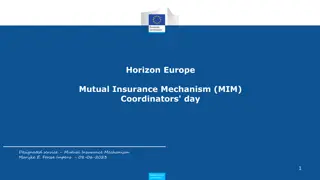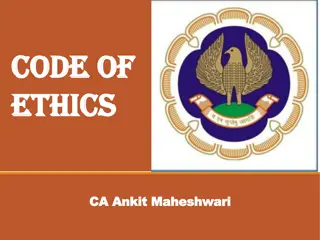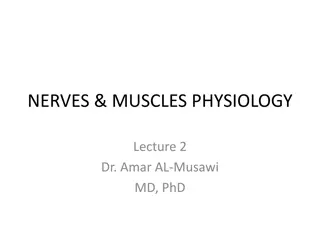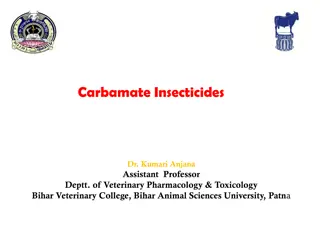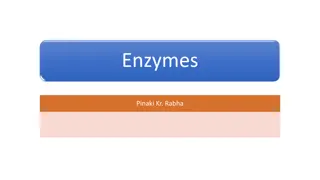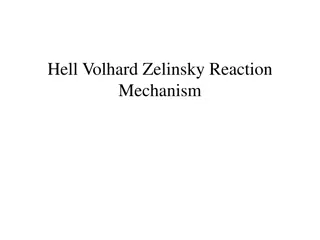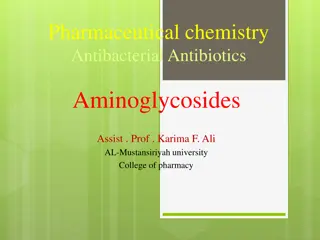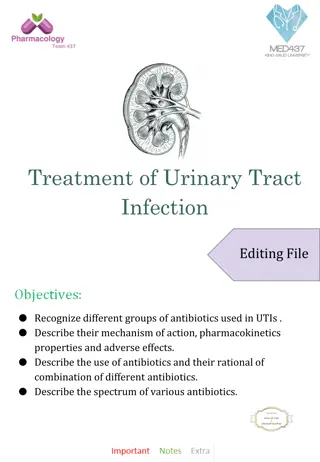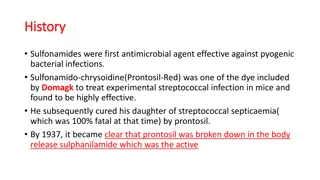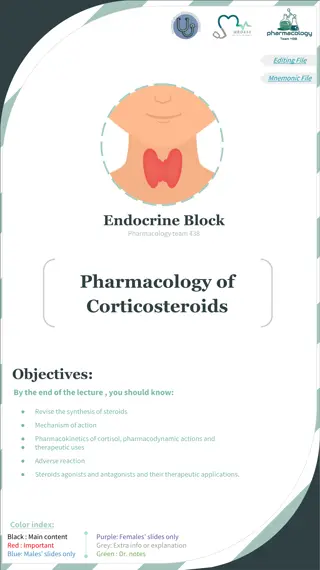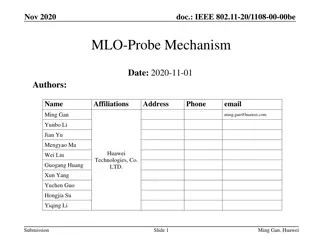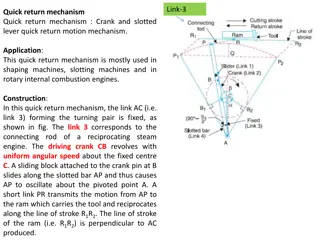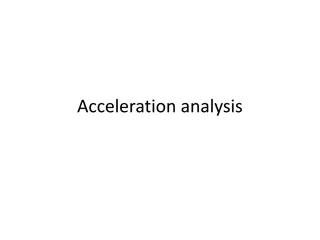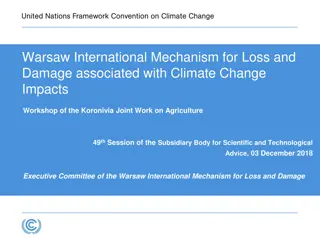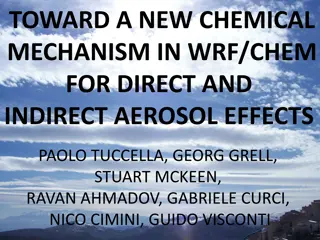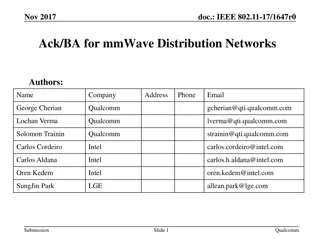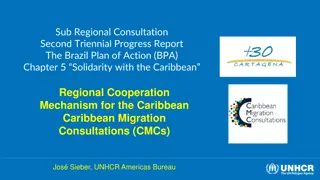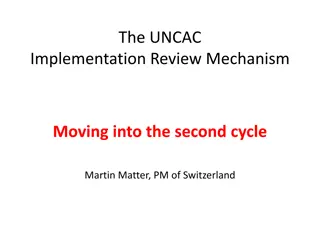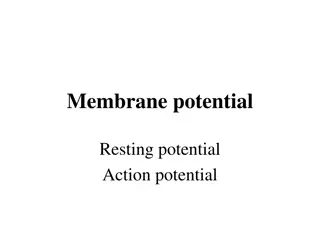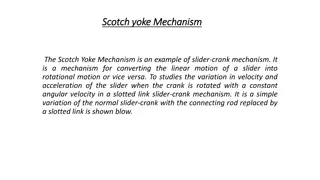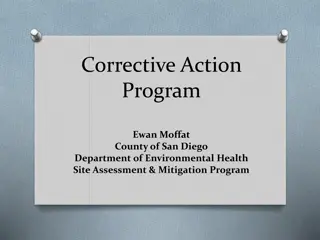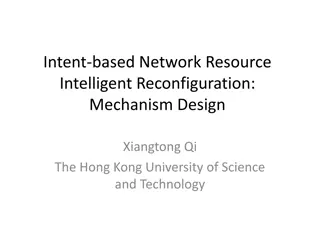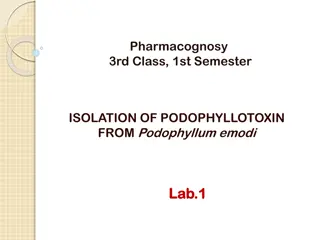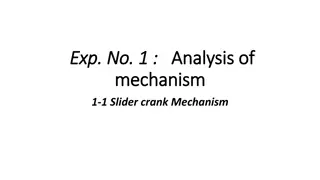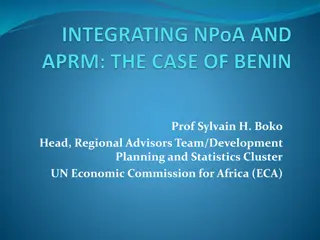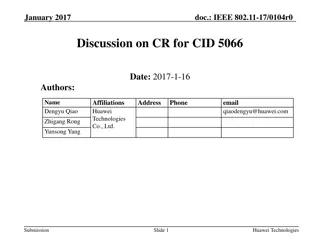Overview of Compliance, Quality Assurance, Ethics, and Disciplinary Mechanism in ICAI
This content discusses various aspects of compliance in the Chartered Accountants sector, including the Quality Assurance Mechanism, Code of Ethics, Disciplinary Mechanism, and details on who can file complaints. It also highlights the amendments in the Chartered Accountants, Cost and Works Accounta
5 views • 37 slides
Understanding the Horizon Europe Mutual Insurance Mechanism (MIM)
The Horizon Europe Mutual Insurance Mechanism (MIM) is designed to protect the financial interests of the EU budget by simplifying administrative processes and providing coverage for grants. It started with the FP7 projects and continues through Horizon Europe projects. Any grant previously covered
2 views • 14 slides
Overview of Ethics, Quality Assurance, and Disciplinary Mechanism in ICAI
This information covers the Code of Ethics, Quality Assurance Mechanism, and Disciplinary Mechanism in the Institute of Chartered Accountants of India (ICAI). It includes details on the ethical standards, peer review boards, disciplinary procedures, and who can file complaints. Additionally, it high
1 views • 37 slides
Proposed Approach for MAC Address Assignment in IEEE 802.11
IEEE 802.1CQ is working on a mechanism to assign local MAC address blocks to end nodes specifically related to IEEE 802.11 standards. The current draft lacks a pre-association mechanism for IEEE 802.11 stations to obtain a local MAC address before association. The proposed remedy suggests specifying
6 views • 7 slides
Grievance Redress Mechanism: Enhancing Project Efficiency
Understanding the Grievance Redress Mechanism (GRM) is crucial for effective project management. This mechanism aims to address complaints and concerns related to project implementation, ensuring transparency and stakeholder engagement. By sensitizing facility GRM focal persons and following structu
4 views • 26 slides
Understanding Nerves and Muscles Physiology: Lecture Insights by Dr. Amar AL-Musawi MD, PhD
Delve into the intricacies of cardiac action potential, mechanism of action potential propagation, rhythmicity in excitable tissues, and the crucial concept of refractory period. Explore how voltage-gated channels influence the duration of action potential and learn about the spontaneous generation
0 views • 12 slides
Understanding Scorpion Poisoning: Composition, Toxicity, and Mechanism of Action
Scorpion poisoning is a serious issue presented by Meriam Nabil Nasseif, Assistant Lecturer of Clinical Toxicology at Minia University. This comprehensive guide explores the physical properties of scorpions, the composition of their venom, toxicity effects on the human body, and the intricate mechan
0 views • 23 slides
Understanding Carbamate Insecticides: Classification, Mechanism of Action, Clinical Signs, and Treatment
Carbamate insecticides are widely used in agricultural and veterinary practices due to their broad-spectrum activity and low mammalian toxicity. This chapter discusses the classification, similarities with organophosphate compounds, differences, mechanism of action, clinical signs, diagnosis, and tr
1 views • 13 slides
Inter-Agency SEA Community Based Complaints Mechanism in Nigeria
The Inter-Agency SEA Community Based Complaints Mechanism in Nigeria facilitates safe and confidential reporting of complaints, particularly related to sexual exploitation and abuse (SEA), by beneficiaries. Through inter-agency coordination, this mechanism ensures effective collaboration, messaging,
1 views • 18 slides
Understanding Enzymes: Nature, Classification, and Mechanism of Action
Enzymes are biocatalysts synthesized by living cells. They are protein in nature and specific in their action. This article delves into the definition of enzymes, classification based on enzymatic action, enzyme class reactions, structure, and mechanism of enzyme action, highlighting how enzymes pla
1 views • 19 slides
Understanding the Hell-Volhard-Zelinsky Reaction Mechanism
The Hell-Volhard-Zelinsky (HVZ) reaction is a unique halogenation method for carboxylic acids at the alpha carbon, involving phosphorus tribromide and bromine. This mechanism, named after its chemists, requires severe conditions and can lead to specific products or limitations such as beta unsaturat
0 views • 8 slides
Understanding Aminoglycoside Antibiotics in Pharmaceutical Chemistry
Aminoglycoside antibiotics like streptomycin, kanamycin, neomycin, and gentamicin are vital in treating serious infections caused by Gram-negative bacteria. Their mechanism of action involves inhibiting protein synthesis in bacteria. These medications are poorly absorbed orally but are effective aga
0 views • 26 slides
Understanding Fluconazole: Mechanism, Spectrum, and Clinical Applications
Explore the mechanism of action, spectrum of activity, pharmacokinetics, and clinical uses of fluconazole. Learn about its role in treating various fungal infections, including candidiasis, cryptococcosis, and dermatophytosis, while being aware of resistance issues and dosing considerations.
0 views • 30 slides
Antibiotics for Urinary Tract Infections: Mechanism, Pharmacokinetics, and Use
Urinary tract infections (UTIs) are common, with various bacteria causing the infection. Different groups of antibiotics are used to treat UTIs, each with its mechanism of action, pharmacokinetic properties, and adverse effects. Antibiotics such as Co-trimoxazole, Nitrofurantoin, and Cephalosporins
0 views • 16 slides
Sulfonamides: History, Chemistry, and Mechanism of Action
Sulfonamides, the first effective antimicrobial agents against bacterial infections, have a rich history and chemistry rooted in sulphanilamide derivatives. Their mechanism of action involves inhibiting folic acid synthesis through competitive antagonism and sequential blocking with diaminopyrimidin
0 views • 27 slides
Pharmacology of Corticosteroids: Synthesis, Mechanism of Action, and Therapeutic Uses
Corticosteroids are steroid hormones produced by the adrenal cortex, divided into glucocorticoids and mineralocorticoids. They play crucial roles in metabolism, immunity, inflammation, and electrolyte balance. Glucocorticoids like cortisol stimulate gluconeogenesis, influence glucose levels, and hav
0 views • 9 slides
IEEE 802.11-20/1108-00-00be MLO Probe Mechanism in AP MLD
This document discusses the design and implementation of a mechanism for a non-AP STA to send a probe request frame to an AP within an AP MLD, allowing the STA to request a probe response containing information on all APs affiliated with the same MLD as the target AP. It proposes the use of new elem
1 views • 12 slides
Understanding Quick Return Mechanism in Machinery
Exploring the application, construction, and velocity analysis of the crank and slotted lever quick return motion mechanism commonly used in shaping machines, slotting machines, and rotary internal combustion engines. The mechanism involves fixed link AC, driving crank CB, sliding block, and short l
8 views • 14 slides
Acceleration Analysis of Slider Crank Mechanism
In this analysis, we calculate the acceleration of the slider at point B, acceleration of point E, and the angular acceleration of the link AB in a slider crank mechanism. The steps involve drawing configuration, velocity, and acceleration diagrams with suitable scales to determine the necessary par
0 views • 12 slides
Comprehensive Overview of Propofol: Mechanism, History, and Pharmacokinetics
Propofol is a widely used IV hypnotic with a unique mechanism of action involving GABA receptors and dopamine modulation. Its history, from initial anaphylactic reactions to current emulsion formulations, is intriguing. Understanding its pharmacokinetics, including metabolism in the liver and kidney
0 views • 59 slides
Warsaw International Mechanism for Loss and Damage: Addressing Climate Change Impacts
The Warsaw International Mechanism for Loss and Damage focuses on addressing climate change impacts, including extreme events and slow-onset events, in vulnerable developing countries. Through its Executive Committee, the mechanism aims to enhance dialogue, understanding, and action to support those
2 views • 11 slides
Advancements in Chemical Mechanisms for Aerosol Effects in WRF/Chem Model
This study focuses on the development of a new chemical mechanism in the Weather Research and Forecasting with Chemistry (WRF/Chem) model to address the underestimation of carbonaceous aerosols. The RACM/MADE/SOA-VBS mechanism incorporates advancements in gas-phase chemistry and particle parameteriz
0 views • 12 slides
Acknowledgment Mechanism for mmWave Distribution Networks
This document discusses the proposal for an Acknowledgment (Ack) and Block Acknowledgment (BA) mechanism for Time Division Duplex (TDD) Channel Access in mmWave Distribution Networks. The requirements for sending Ack/BA in different slot structures to accommodate various traffic profiles are outline
1 views • 12 slides
Three-Party Funding Mechanism for Debt Relief and Climate Action Support in Developing Countries
Developing countries require significant financial support to address climate vulnerabilities, surpassing current commitments from developed nations. A suggested three-party funding mechanism aims to facilitate ongoing funding for climate projects while providing debt relief to vulnerable countries,
0 views • 11 slides
Understanding Affirmative Action: Origins and Criticisms
Affirmative Action was first proposed in the US by President John F. Kennedy in 1961 to combat discrimination. It aimed to prevent discrimination based on race, color, religion, sex, and national origin. This policy evolved into two forms: Strong Affirmative Action, which involves preferential treat
0 views • 39 slides
Solidarity with the Caribbean: Regional Cooperation Mechanism for Migration Consultations
The Sub-Regional Consultation Second Triennial Progress Report outlines the Brazil Plan of Action's Chapter 5 on solidarity with the Caribbean through the Caribbean Migration Consultations. It emphasizes the origins, purpose, achievements, and follow-up actions related to the Regional Consultative M
0 views • 6 slides
UNCAC Implementation Review Mechanism: Moving Towards the Second Cycle
The UNCAC Implementation Review Mechanism is progressing into its second cycle, with a focus on evaluating challenges and terms of reference at the conclusion of each review cycle. The performance assessment has highlighted achievements in enhancing awareness and involvement of civil society/private
0 views • 7 slides
Understanding Membrane Potential and Action Potentials in Excitable Cells
Membrane potential, resting potential, and action potentials play crucial roles in the functioning of excitable cells like neurons, muscle cells, and endocrine cells. Voltage-gated channels, depolarization, and repolarization are key processes involved in generating and propagating action potentials
0 views • 26 slides
Cardiotoxic Glycosides in Plants: Toxicity and Mechanism of Action - Overview
Plants like Nerium oleander, Thevetia peruviana contain cardiotoxic glycosides causing toxicity in animals and humans. Poisoning with these plants can be fatal, affecting the heart and nerves. Toxicity is mainly due to compounds like oleandroside and oleandrin, leading to cardiac failure and gastroi
0 views • 13 slides
Understanding The Scotch Yoke Mechanism: Experiment and Analysis
The Scotch Yoke Mechanism is a slider-crank mechanism that converts linear motion into rotational motion or vice versa. This experiment involves studying the velocity, acceleration, and displacement of a slider as the crank is rotated with constant angular velocity in a slotted link slider-crank mec
0 views • 5 slides
San Diego Environmental Health Corrective Action Programs Overview
In the County of San Diego, the Department of Environmental Health oversees Corrective Action programs for permitted facilities. This includes the Corrective Action Designation, SAM Programs, exclusions from Corrective Action, and sources of Corrective Action cases. The program covers releases from
0 views • 12 slides
Intelligent Mechanism Design for Intent-Based Network Resource Reconfiguration
An exploration of intent-based network resource reconfiguration through intelligent mechanism design, focusing on concepts such as intent setting, abstract views of intent networks, mechanism design, network traffic control examples, system optimization, and underlying optimization strategies. Vario
0 views • 11 slides
Mechanism Design and Auction Theory in Game Economics
Today's lecture covers the concepts of mechanism design and single-item auctions in the field of algorithmic game theory. Mechanism design focuses on reverse-engineering existing game systems to achieve desired objectives, while auctions play a crucial role in various scenarios such as online market
0 views • 30 slides
Understanding Podophyllotoxin: Isolation, Mechanism of Action, and Medicinal Uses
Learn about the isolation process of podophyllotoxin from Podophyllum emodi, a lignan with potential medicinal applications. Explore its mechanism of action as a tubulin polymerase inhibitor and its uses in treating genital warts and various cancers. The structure of podophyllotoxin and its signific
0 views • 14 slides
Analysis of Slider-Crank Mechanism and Experimental Data
Slider-crank mechanism analysis involves understanding the transformation of input motion into desired output motion. This mechanism consists of a crank, coupler, slider, and ground link, converting circular motion into linear motion. Experimental procedures involve setting crank angles and recordin
0 views • 6 slides
The African Peer Review Mechanism (APRM) and Benin's Progression
The African Peer Review Mechanism (APRM) is a governance mechanism voluntarily adopted by African nations to promote democracy, stability, and sustainable development. This article discusses the importance of the APRM, its stages, and Benin's progression within the mechanism, showcasing key indicato
0 views • 17 slides
Understanding Our Political Economy Through Economic Theory and Price Mechanism
Explore the intricate dynamics of political economy through neoclassical economic theory, price mechanism analysis, and the role of land as a factor of production. Delve into concepts like labor demand, capital goods, credit markets, and the limitations of the price mechanism in certain contexts. In
0 views • 30 slides
Climate Action Project - Inspiring Change in Schools
Urgent climate change issues were explored this week, emphasizing the importance of everyone's involvement. The impact of climate change on Earth and the significance of climate justice were highlighted. Climate anxiety and global solutions were discussed, emphasizing that personal actions can lead
0 views • 8 slides
Critique of Transatlantic Trade & Investment Partnership (TTIP) and ISDS Mechanism
The content discusses the concerns and criticisms surrounding the Transatlantic Trade & Investment Partnership (TTIP) and the Investor-State Dispute Settlement (ISDS) mechanism. It highlights issues such as undemocratic practices, economic myths, impacts on workers' rights, safety regulations, clima
0 views • 44 slides
Discussion on Improving Transmission Efficiency in IEEE 802.11 TWT Mechanism
This document proposes enhancements to the IEEE 802.11 TWT mechanism to address issues related to random access Resource Units (RU) utilization. By defining a mechanism to optimize RU allocation for TWT scheduled STAs, the proposal aims to improve transmission efficiency and power saving, particular
0 views • 11 slides

